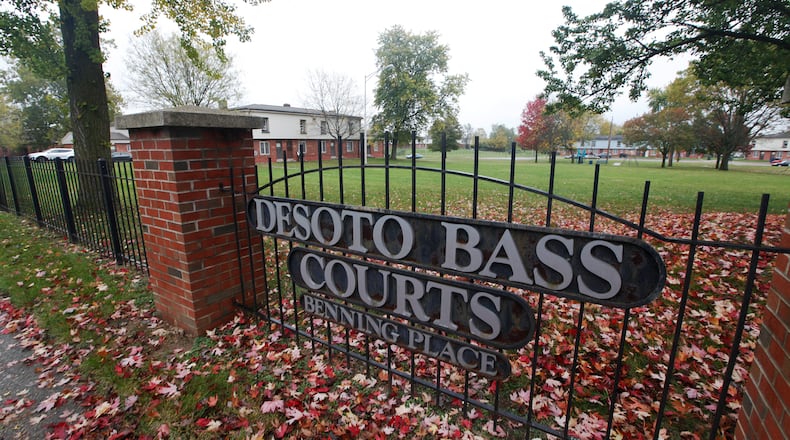“The pandemic really showed us how bad it is, not just for students, but for their parents and anyone that’s trying to work and anybody that’s trying to get benefits,” Montgomery County Commissioner Debbie Lieberman said. “It really showed how the digital divide is really a hardship on so many in our community.”
The accepted proposal was developed by Cincinnati Bell and CareSource with input from more than a dozen community partners, including Montgomery County, which approved $2 million in funding toward the initiative on Tuesday.
The initiative will debut at Park Manor, Wilkinson Plaza, Westdale Terrace, Fitch and Hawthorn and Desoto Bass Courts, where some of the hardware and wiring is up and waiting connections.
“Everybody in my building has problems getting internet,” said Lei Reynolds, who lives in Desoto Bass with her two children, a 4-year-old and 18-year-old, who are both trying to attend school via her phone’s hotspot.
“That’s just not enough,” Reynolds said. “It goes in and out. So yeah, we need it.”
Credit: Chris Stewart
Credit: Chris Stewart
As many as 100,000 residents in the Dayton metro area do not have access to the internet from home, according to project planners. The digital divide won’t be bridged overnight, but the initiative is “a first step in a much broader roadmap toward digital equity in Dayton and Montgomery County,” read Cincinnati Bell’s proposal to the county.
About 40,000 households — or 13% — in the Dayton metro area lacked access to the internet, according to 2018 Census Bureau American Community Survey data. About 9% of households had no computer and about 9.6% had a smart phone but no computer.
Jennifer Heapy, CEO of Greater Dayton Premier Management, said the collaborative community effort will help low-income residents disproportionately impacted by the pandemic. She said online access should be viewed as indispensable as utilities like water, heat and electric.
“Historically, over the last decade or so — probably even longer — the internet and access to the internet has really been an essential service for people to have full economic and educational opportunities,” Heapy said.
The more than $2.8 million agreement with Cincinnati Bell covers the hardware, software and installation of the system and three years of internet service to each of the 875 housing units. The initiative also provides 1,138 Chromebooks, one for each unit plus 10% to account for replacements and tenant changes.
The company is also providing free a fiber upgrade for the Boys & Girls Club of Dayton, where the county and partners will gather to launch the initiative this afternoon.
Internet connectivity should make it easier for residents to find work, Montgomery County Commission President Judy Dodge said.
“This is going to get them on the internet and get them to be able to put their resumes out there. It’s a win-win,” Dodge said.
Backers of the program also say low-income residents face not only a barrier in receiving telehealth services, but face greater everyday dangers to health.
“Without the tools afforded by internet access and devices, individuals are forced to take more risks in navigating day-to-day life, possibly contributing to the disproportionate impact of COVID-19 on minority and low-income communities,” the initiative proposal reads.
Community partners are working toward a sustained source of funding to continue the service following the initial three-year period.
About the Author


